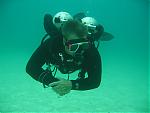Oh, that just begs for a rhyme rendition:You have more than a few choices here on what you can do, so now the bottom line is up to you.
A yoke can blow that dried up o-ring
Without a spare, you'll feel the sting
You may throw the old yoke, in the bin,
And come up to date, with the DIN
You've now got more choices, on what to do,
So the bottom line, it's up to you
Ok, so I just woke up this a.m.






 Reply With Quote
Reply With Quote






